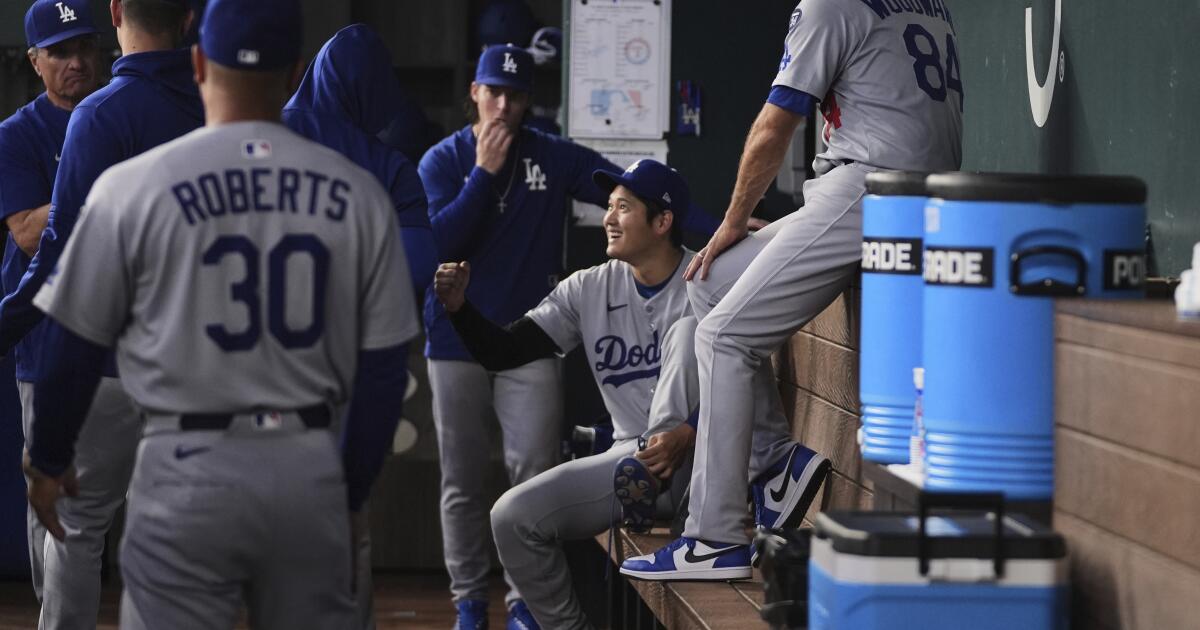ARLINGTON, Texas — As a father of two, Dave Roberts is a true believer.
“Dad strength,” he declared Sunday morning, “is real.”
Which, naturally, made the Dodgers manager all the more excited about the return of the team’s newest dad: Shohei Ohtani.
“Now that he is a father,” Roberts joked, “we might see some 120 [mph] exit velos off the bat.”
Indeed, when Ohtani rejoined the Dodgers on Easter morning, after being away for two games for the birth of his first child this weekend, he was met with a wave of congratulations — and also a hint of expectation.
Sure, the so-called theory of “dad strength” — gains in physical strength and stamina that some new dads seemingly experience upon entering fatherhood — might be more of a playful urban legend than scientifically proven fact.
But when it came to Ohtani, intrigue was palpable.
“I’m sure if there is someone that is gonna have it,” teammate Mookie Betts said, “it’s Shohei.”
Whatever fatherly forces Ohtani acquired this weekend, when he and wife Mamiko Tanaka welcomed a baby girl, weren’t immediately on display in his first game back in the lineup.
In the Dodgers’ 1-0 win on Sunday, Ohtani walked just once and went hitless in three other at-bats. His top exit velocity was only 82 mph. Roberts said after the game that the reigning MVP looked a little unsettled at the plate.
“[He was] overly aggressive,” Roberts said after Ohtani hit two groundouts and a strikeout. “Having two days off, I think today he just came a little anxious.”
Still, it did little to dampen belief in the dad strength phenomenon — one that, well before Ohtani entered the ranks of parenting, has become particularly popular within professional baseball.
In recent years, several MLB stars have had memorable “dad strength” surges; perhaps none more notable than when Angels slugger Mike Trout hit six home runs in his first eight games after becoming a father in 2020.
MLB’s website even tracks what it terms as “dad strength home runs,” listing the 26 players since 2011 who have gone deep in their first game back from paternity leave. Phillies star Bryce Harper, remarkably, has done it twice.
Around the Dodgers’ clubhouse Sunday morning, several players recounted their own dad strength experiences.
Third baseman Max Muncy noted how, after the birth of his daughter, Sophie, in July 2021, he went on to receive MVP votes at the end of what became a career-best season — even if, he added with a laugh, there were plenty of “dad ache” moments that also came along with it.
“Just when your arms start hurting holding the baby, and your back starts hurting,” he said. “I had more of those moments than I had dad strength moments.”
Tommy Edman joked that his own recent power surge, which has seen the once light-hitting utilityman rack up 13 home runs in his last 60 games going back to last season, has come in the wake of his son Eli’s arrival two offseasons ago.
“Ever since he’s been born,” Edman said, “my home run rate has gone up.”
Plenty of others detailed changes they noticed away from the field upon becoming fathers.
Evan Phillips said he feels his dad strength whenever he’s carrying groceries or other baby-related products for his 2-year-old son, Beau.
“When the baby stuff at home happens, you just gotta make it happen,” he said.
While Phillips was on a rehab assignment with triple-A Oklahoma City last week, he highlighted another benefit not shared by younger prospects in the organization.
“We had an 11 a.m. game … and everyone is walking in all dragging,” Phillips chuckled. “And I’m like, ‘Guys, I woke up at the same time I always do.’”
Veteran pitcher and father of four, Clayton Kershaw, explained a similar dynamic.
“I think you just have more energy,” he said. “You just have to. Like now, I don’t ever feel the need to really sit down. I just am ready to go, all the time.”
“When you don’t have kids, you feel like, ‘Oh gosh, I just need to relax,’ or like, ‘I just need a day,’” Kershaw added. “Now, you don’t have that. But you don’t need it, either.”
Roberts, too, recalled dad strength moments from his playing days, crediting it for a few of the 23 career home runs he hit over 10 years in the majors.
“There’s something to the dad strength,” he reiterated. “But [I was] nothing close to Shohei.”
Ohtani, of course, isn’t exactly lacking for physical capabilities on the field. Last season, he became the first player in MLB history to have a 50-homer, 50-steal campaign. This year, he already has six long balls, five stolen bases and, according to MLB’s Statcast data system, one of the five hardest swings in the majors.
However, Roberts noted, it’s the renewed perspective fatherhood provides that usually drives the biggest transformation of players.
“Some of the attributes you get from being a dad do translate to the baseball field,” he said.
“Not sweating the small stuff. Understanding what’s most important. I have seen our players evolve in how they look at life and baseball.”
And to that end, how Ohtani navigated his first weekend of fatherhood had already made an impression on the manager.
“For him to just make sure the baby was healthy and to get back here, and to be a part of this, certainly shows his ability to balance life and work,” Roberts said. “It’s good to have him back. And most importantly, I’m happy him and Mamiko have a healthy baby girl.”
